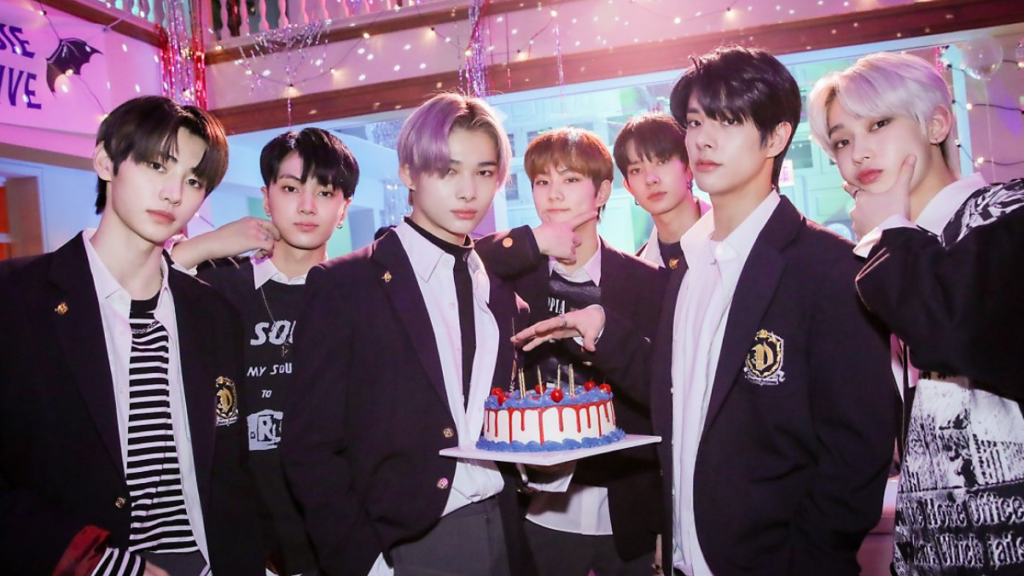The Importance of Nothing: An Interview with Director Wesley Wang

*Warning: Minor spoilers for nothing, except everything are in this article.
At the 2023 Indy Shorts International Film Festival, 19-year-old writer and director Wesley Wang accepted the Summer White Lynch Memorial Award for nothing, except everything (2023). But just a few short days before his short film premiered at the festival, he sat down with EnVi over Zoom to talk about the importance of nothing, chaos, and the process of making nothing, except everything.
The Reasons for Nothing
Nothing, except everything follows the main character Miles (David Mazouz) through his senior year of high school. He navigates change in his life by focusing on the number seven, but he soon finds a different thing to bring order: a girl named Harper (Lily Chee). Wang said that he started writing the screenplay during his senior year of high school when he was experiencing the same changes Miles was experiencing. “It was me just basically spilling my heart out onto the page,” Wang said. “All this chaos and this uncertainty I was feeling, I wanted to kind of ground that in some sort of order, so that’s what the film kind of explores.”
Wang said telling the story of nothing, except everything through a Gen Z lens was important because he thought there was a general lack of a younger perspective in media. So, he “decided to make something that I think young people will really resonate with.” Part of this perspective found in Miles’s story came from the conversations Wang had with his friends about the world and everything going on around them.
“There’s this ever-increasing feeling of nihilism and existentialism in today’s youth. It just feels like the world is getting more polarized and chaotic every day, and especially the youth is feeling this more with climate change and all these existential issues,” Wang explained. “So I think I was feeling that and I just tried to portray that in the most authentic way to me, which was really, really chaotic and kind of just a lot of things that feel like snippets that don’t make sense but make so much sense at the same time.”
Everything Matters Behind the Scenes
Thousands of choices behind the camera made Miles and Harper’s story come together. Wang said that writing the script was mostly autobiographical, and the first scene he wrote was an awkward conversation in the driveway between Miles and Harper, which he said really happened to him. After he showed it to the girl who inspired the scene, as well as some friends, Wang knew that he had to turn it into something more. “I thought that was like, something so relatable to, like, young people that I thought, ‘Why not?’ Let’s expand on this and think about other things that are very relatable to our generation,” he explained.
One of the pivotal moments in nothing, except everything features Miles and Harper driving down a tunnel in a convertible standing up and screaming. Wang, who said it referenced a similar moment in The Perks of Being a Wallflower (2012), shared that he wanted to get that shot no matter what. Shot in the Holland Tunnel between New York City and New Jersey, the cast and crew set up in a parking lot in New Jersey. They taught Chee how to drive in the parking lot, while his producer Scott Aharoni drove the chaser car, since he was the only one who could. However, Wang noted that through the magic of filmmaking, it looked much faster than the 25 miles per hour they were actually driving.
Montages, what Wang referred to as the “cheat-code of filmmaking” and a “guilty pleasure,” are used throughout the short to represent the different kinds of chaos and order that are found in Miles’s life. What made those moments of order and chaos so impactful was the music that was paired with the imagery, explained Wang. “The music was the first thing in the script that I knew ‘This had to be it.’ I kind of based the script around it [the music] a little bit, and definitely based the shot list and everything else, the blocking [around it],” he said.
Even the music that didn’t make it into the film helped inspire the movie. “I had a whole nothing, except everything Spotify playlist,” he said. Appearances from the C’mon C’mon (2021) and Lady Bird (2017) soundtracks helped bring the “transcendental-coming-of-age vibe” while Wang was writing about the constants and changes that come with graduating high school and growing up.
Taking Away Everything
While Miles used the number seven to try and find order in the chaos, Wang said he never really tried to find order and instead embraced the chaos in high school. In fact, what the young director took away from making the movie was that there is no order. “I think my personal philosophy changed throughout the movie,” he said. He explained that originally he thought that people should strive to find order and derive meaning from life, but by the end he’d found that “nothing matters, but at the same time you can live your life like everything matters.” Wang said that he’d just talked to his girlfriend, and they’d come to the conclusion that “If nothing matters, then so does the fact that nothing matters.”
But what he found through making the film doesn’t have to be what other people take away from it. His only hope, he said, was “that it really hits you. Somehow it’ll find truth in people, regardless of what they say it means to them.”
Moving Toward the Chaos
Wang expressed interest in exploring the themes of chaos and order, nothingness, and meaning in a feature-length version of his short or in a project inspired by corecore. “[We’re] trying to decode this chaos with something that makes no sense but it feels right,” he said.
Moving toward the chaos of the future can feel uncertain, which is at the heart of the film. Throughout nothing, except everything, Miles and Harper think about the future and what they will and won’t remember, including each other. Both the characters and Wang wrestled with the question of whether it’s better to forget or not. “The purpose of life [is] just to gain as much happiness along the way,” he concluded.
You can follow the movie on Instagram for updates here.
Want more ACT!ON content? Check out EnVi’s piece about nostalgia and media here!



